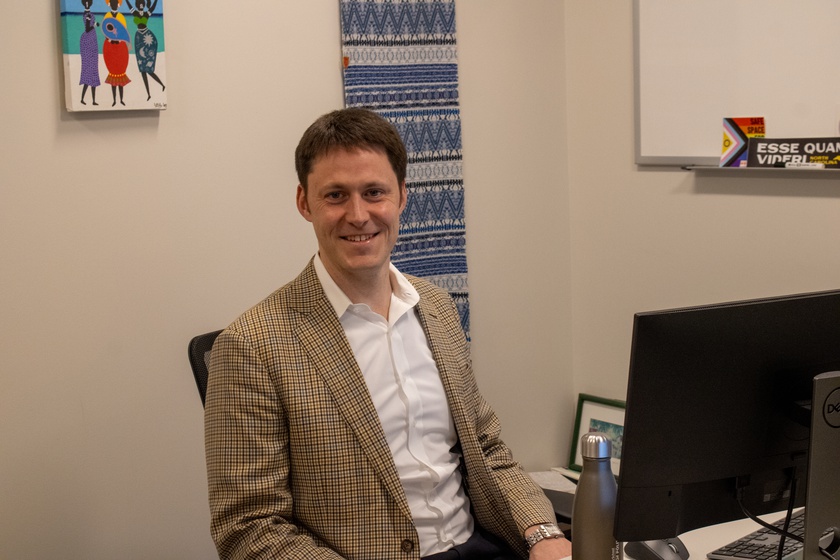{shortcode-640bfa6d3c57c16ad2b53011b3fc6fcea0234ffa}
{shortcode-3f3e57005be88db1897fbe0aab6a26f27b883007}rooks B. Lambert-Sluder ’05 received his first introduction to Harvard while scrubbing toilets with the College’s Dorm Crew in preparation for students’ arrival as a part of the Fall Clean-Up freshman pre-orientation program. Now the assistant director at the Advising Program Office and overseer of the Peer Advising Fellows program, Lambert-Sluder recalls feeling a lack of support when he first arrived at Harvard — at the time, the PAF program did not yet exist.
He kept hearing about “Ec10,” the abbreviation for the flagship introductory economics course Economics 10, which everyone except for him seemed to already know about. It was then, Lambert-Sluder says, that he felt like everyone else had a support system on campus that he did not have access to, as he knew no one coming to Harvard.
As we talk in his office decorated with baseball memorabilia, he identifies this moment as when he realized the value of having a “near peer” to ask questions during freshman year — the mission of the PAF program he helped build.
“Having an upper-level student who you can feel comfortable asking the questions that sound a little bit dumb in your head, but probably you just don’t know them yet, really made a difference in the way I thought about Harvard,” he says. “I hope that it’'s contributing to the freshman experience.”
As a freshman, he loved living in Canaday because of his vibrant entryway, even if the dorm wasn’t “the most attractive building to look at.”
“But as they say,” he assures us, “the benefit of being inside one of those buildings is that you don’t have to look at it.”
“The idea of an entryway as a microcosm of Harvard, it couldn’t have been more true for me,” he says. “It was people from all over — very different backgrounds and ideas than mine. The entryway was a fantastic place for me.” For Lambert-Sluder, it was the entryway that “made Harvard feel home, or home-like, at least.”
Since graduating from Harvard, he worked with the entryway as a proctor for 11 years and has worked in the APO since its inception in 2006. In nearly 20 years, he has witnessed Harvard’s advising programming evolve, including the PAF program.
The PAF program, he says, exists not only to guide freshmen during the significant transition to college in the fall, but to support them in every aspect of their Harvard journey.
“It’s really hard to thrive in the classroom if you don’t have a sense of belonging outside the classroom and vice versa,” Lambert-Sluder says.
He explains that a successful advising program cannot solely focus on a student’s academic success, but must consider every aspect that makes up their Harvard experience.
“If any adviser is asking a student how they’re doing and they only talk about their classes, that’s just not enough,” he says.
Lambert-Sluder’s commitment to building community has stayed constant throughout his career in advising. He laughs while recounting a story where his entryway and PAFs pranked him with a fake party. He opened the door to loud music and red solo cups after getting a call from a nearby proctor, but once he saw the PAFs he knew the whole entryway was in on it.
He has been instrumental in creating community amongst his PAFs and his students. Tianming “Tex” Xie ’24, one of the program’s current leaders, called “Eagle PAFs,” fondly recalls first getting to know Lambert-Sluder over some “really good beef stew” at his house. He also describes Lambert-Sluder as “always learning” and stresses how important he has been in creating both “short-term and long-term change.”
Xie also pointed to how beneficial the PAF program is at giving students a peek into how administration works, especially through the Eagle PAF weekly meetings.
Supporting the PAFs is important to Lambert-Sluder. “You can’t feel like you’re thriving as a PAF if you don’t feel like you’re thriving in other spaces in your life on campus,” he explains. About half of the PAFs return every year, and a handful go on to become proctors or tutors.
“I think it’s really fun to see them go off and take those experiences of dedication and reliability and curiosity and commitment to building communities and resourcefulness and then do that in other areas,” he says. “I’m one of the luckiest people around Harvard to be able to have worked with PAFs in such a way.”


